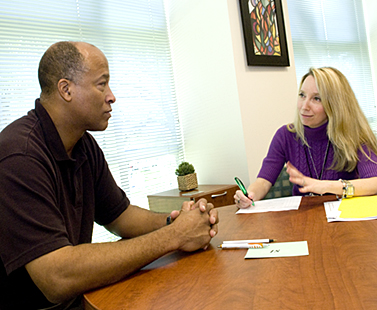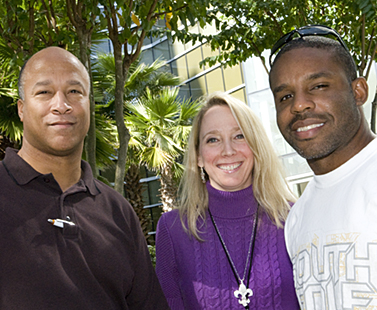Football players tackle memory problems
Jerry Bell got one concussion when he was playing college football and another playing for the Tampa Bay Buccaneers.
That was 20 years ago, but now Bell wonders if those injuries could have had long-term effects.
That question brought him to the USF Health Byrd Alzheimer’s Institute Tuesday for the institute’s annual Memory Screening Day. About 100 people came to get free screening, a process that can show whether they should receive further testing for cognitive problems.
Bell was among them. He sat down with Dr. Amanda Smith, medical director of the Byrd Institute, who asked him a series of questions.
What’s the date? What city are we in? What county? What building are you in? What floor of the building are we on?

Former Tampa Bay Buccaneers tight end Jerry Bell answers questions on a memory screening quiz given by Dr. Amanda Smith, medical director of the USF Health Byrd Alzheimer’s Institute.
Bell, 50, answered the questions with ease. But he plans to return each year, to make sure his cognitive abilities show no signs of decline. Bell knows early diagnosis can slow progress of Alzheimer’s symptoms.
“There’s no cure – but I might get to see my grandkids for five years more,” he said.
Bell is thinking far ahead. His two children are in college, and he has no grandchildren yet.
But his presence at Tuesday’s event had a larger purpose as well. Bell wants to bring more attention to the increased risk of Alzheimer’s for former NFL players. The potential long-term damage of head injuries to football players has been the subject of national debate recently, with a Congressional hearing held to discuss the risks and whether players are adequately safeguarded and treated.
“The thing is, let’s find out what the risk is,” Bell said. “Nobody’s saying, ‘Stop playing football,’ because the guys won’t do it. But put some things in place to make it safer.”
Working to design better helmets, strictly enforcing game rules to help avoid head injuries and treating head injuries with vigilance are among the steps that football coaches and physicians need to take, Bell said.
Both times Bell was concussed, nobody worried much, he said.
“I played the rest of the game,” he said. “That’s how it was done.”
Still, he figures he was lucky. Now a senior account manager for a company that sells computer equipment, Bell played tight end. His linebacker teammates got hit harder and more often.
“I had about half the amount of contact that some people did,” he said.
On Tuesday, he fielded Dr. Smith’s questions correctly as they became more complex.
I’m going to say three words: apple, book, cat. How do you spell “world” backwards? Please count backwards from 100, by 7s. How many words can you say that start with the letter “f?” What were the three words I said earlier?
The range of questions is meant to test different aspects of how the brain works, Dr. Smith told Bell.
“People tend to think of Alzheimer’s as just memory and forgetting,” she said. “But some people show up first with language problems. They can’t find words for things. They hold up a pen and call it ‘that thing you write with.’ “

Former NFL players Jerry Bell, left, and E.G. Green, right, stand outside the USF Health Byrd Alzheimer’s Institute with Dr. Amanda Smith.
Getting that early screening will become even more important as medications now in development make it easier to prevent the symptoms of Alzheimer’s, said Dave Morgan, PhD, chief scientific officer of the Byrd Institute.
“The analogy that I like is that it’s better to take your statins before you have a heart attack, rather than after,” he said.
Bell wasn’t the only NFL player answering such questions at the Byrd Institute Tuesday. Former Colts player E.G. Green, 34, got a screening test as well. Green may seem young to take such a test, but he said it’s important to show that it’s okay for football players to take steps to protect their health.
“We grew up in a culture where you try to mask all injuries,” he said. “You have to be able to make it. You have to ‘tough it out.’ Once the game is over, it’s hard to think you’re not Superman anymore.”
Players, their families and their doctors and coaches need to be aware of that mindset, he said, so that former players get appropriate care.
“You transform from a gladiator to a citizen,” he said. “You need to be able to take care of yourself after football.”
– Story by Lisa Greene, USF Health Communications; photos by Eric Younghans, USF Health Communications

